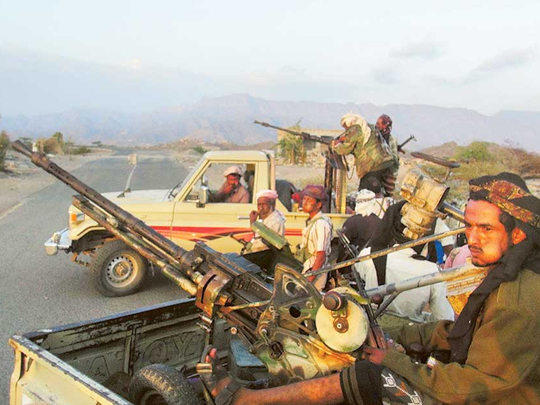
Abu Dhabi: Iran-backed Al Houthi militants will not come to the negotiating table until their arms stockpile is destroyed, analysts said.
“They will not give up their plot to expand Iran’s network of proxies across the region,” Saif Al Jahafi, a leading Yemeni political analyst, told Gulf News yesterday.
He accused the militants of ‘hiding behind Al Qaida’ in order to buy time to carry out their goals.
“Al Houthis fought a series of on-again off-again conflicts with Yemeni governments for most of the last decade in what was commonly known as Al Houthis’ ‘six wars’ against [former president Ali Abdullah] Saleh between 2004 and 2010. Those conflicts led to the then-president’s declining legitimacy in the first decade of the new century,” he said.
“They are doing a great injustice to the Yemeni people by following orders from Iran, which only cares about its expansionist interests with little regard for Yemeni blood,” he explained, pointing out that Tehran has similar policies in Lebanon, Iraq and Syria.
“Their strategy of using force to make Yemenis succumb to their will is clearly not working,” he said. Al Jahafi noted that Al Houthis’ stubbornness is only tightening the noose around their own necks, predicting that their actions will soon backfire.
“The time of salvation has come.”
Southern Yemen is completely liberated from Al Houthi control, he said, and they are now trying to depict the south as being controlled by Al Qaida and Daesh, to mask their own losses.
On Friday, an attack on Yemeni soldiers killed 15 soldiers but it was not immediately clear who carried out the attack. Yemeni officials said the attack was carried out by Al Qaida militants while Daesh said it was behind the assault.
Yemeni security officials said masked men opened fire on pro-government troops and detonated a suicide car bomb at a checkpoint on Friday morning.
A Saudi-led coalition has been fighting Al Houthi militants and their pro-Saleh allies in Yemen since the government was forced into exile in March by a hostile Al Houthi takeover.
Since then, the fighting has left at least 5,700 people dead, about half of them civilians, the UN says.
Omar Abdul Aziz, a UAE-based columnist, said Al Houthis are ‘neither prepared nor willing’ to accept a political settlement. He said they fear they will lose privileges they gained following a GCC-brokered initiative to resolve the Yemeni crisis in 2011 when then-president Saleh agreed to transfer power to then-vice president Abd Rabbo Mansour Hadi, after massive demonstrations demanded he step down from power.
Saleh agreed, in return for immunity from prosecution. The initiative divided power between the opposition and Saleh’s ruling party.
Al Houthis want to go back to the terms of the GCC initiative, said Abdul Aziz. “But, this is impossible now since Al Houthis killed too many people, destroyed major cities and ripped apart Yemen’s national cohesion,” he said.
The Geneva-based Advisory Centre for Rights and Freedoms petitioned the United Nations Human Rights Council over atrocities committed by Al Houthis, including firing on boats carrying civilians who fled the war-torn Yemeni provinces resulting in the deaths of over 75 people
The rights organisation expressed grave concern over the ‘systematic’ killing of civilians including babies, pregnant women and the elderly in ‘horrific’ attacks.
The petition includes testimonies of Yemenis who survived massacres at the hands of Al Houthis and a statement issued by Al Houthi spokesman Mohammad Abdul Salam, who admitted on his Facebook page that his men were targeting civilians for alleged ‘Al Qaida’ ties. The organisation says Al Houthi abuses are systemic.












